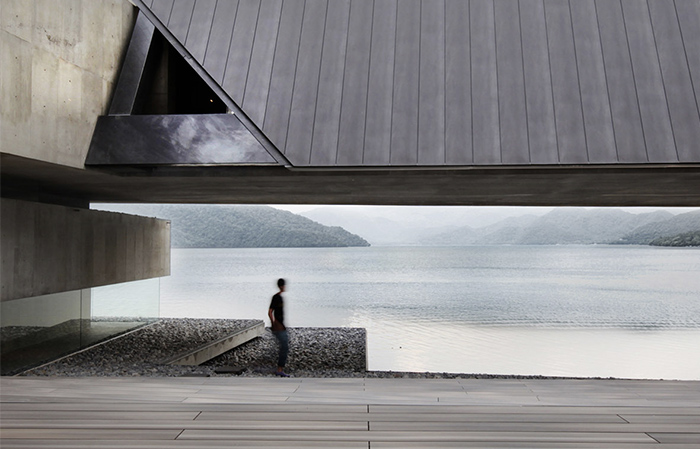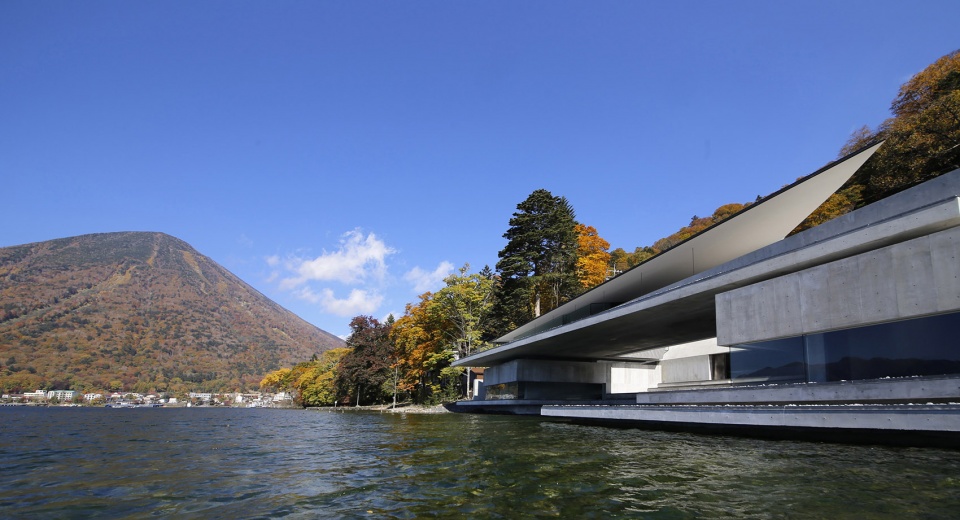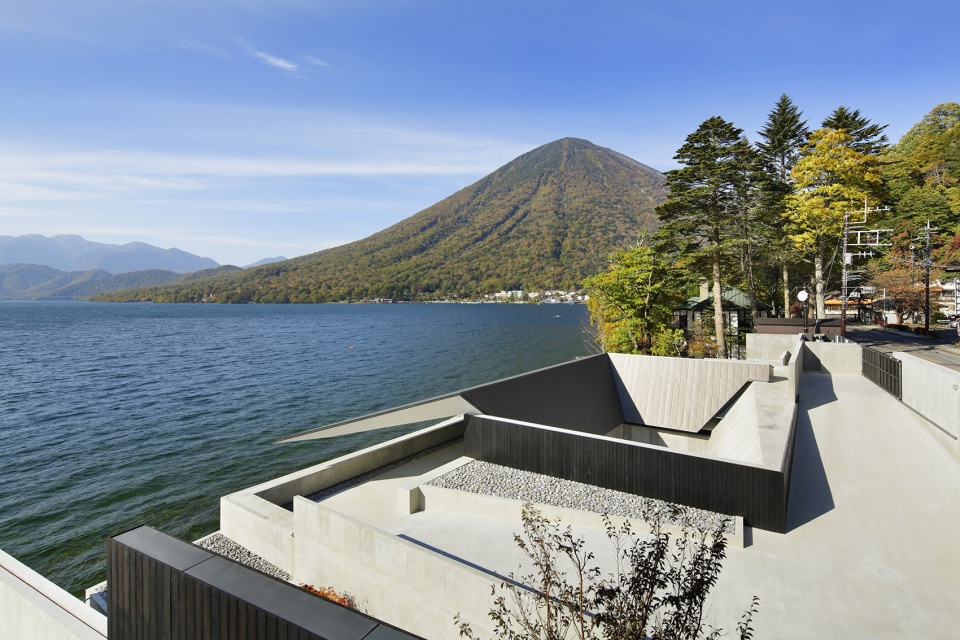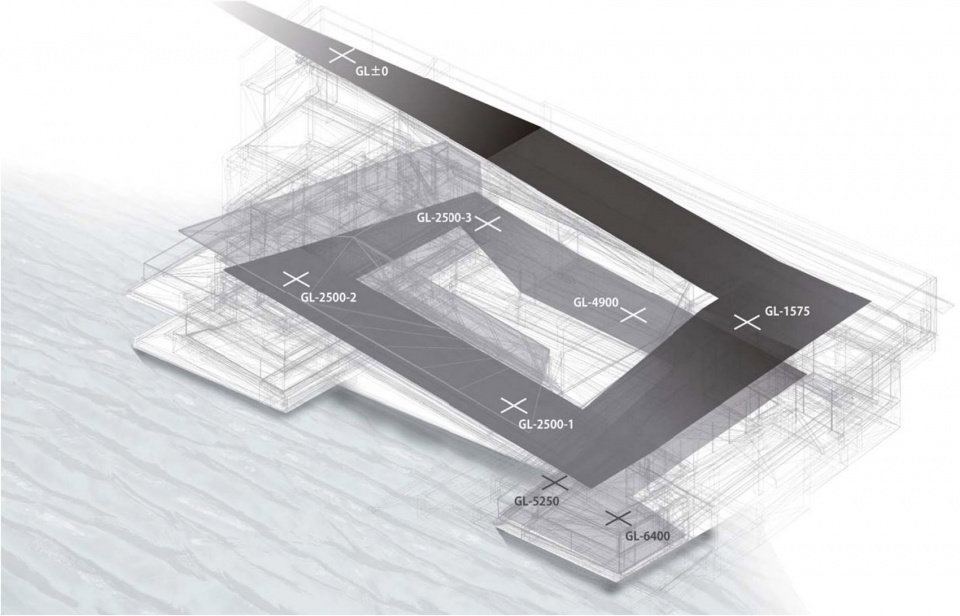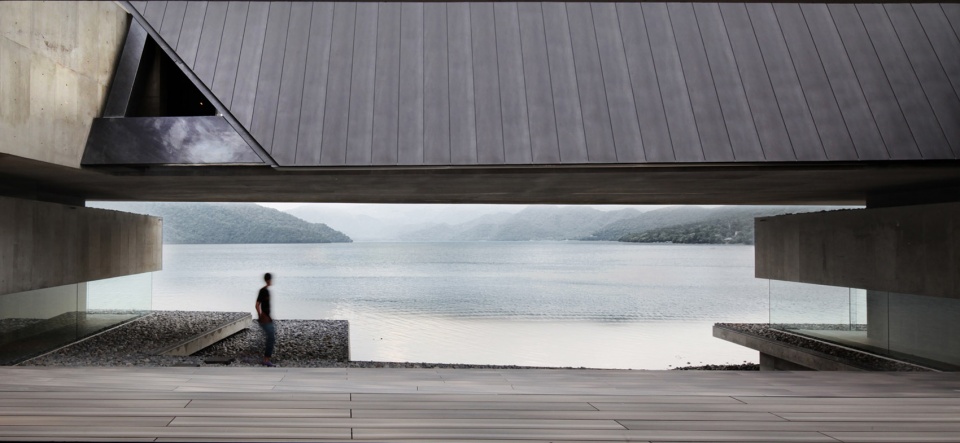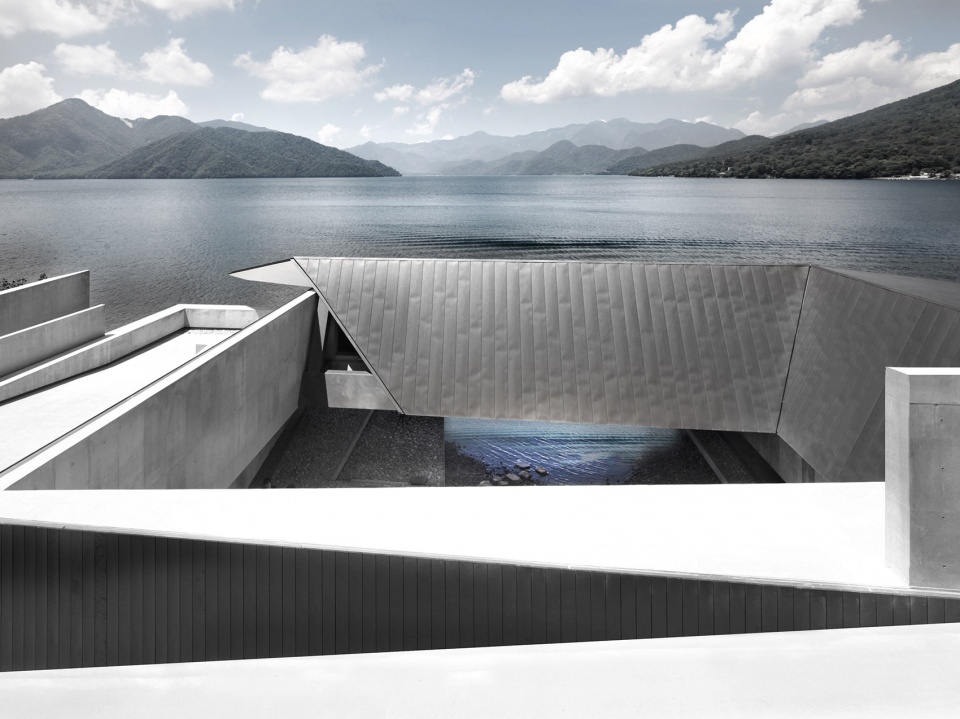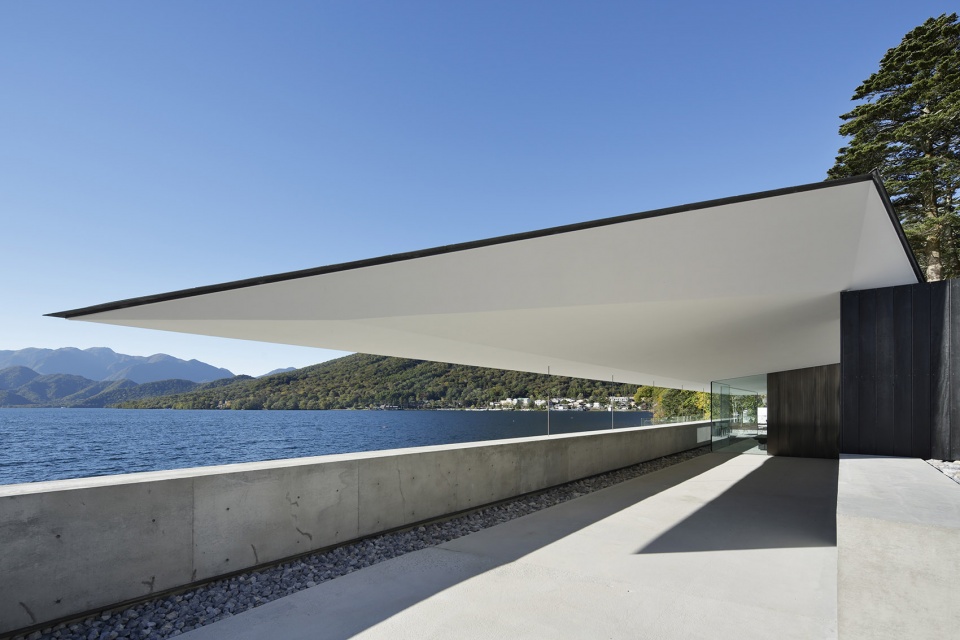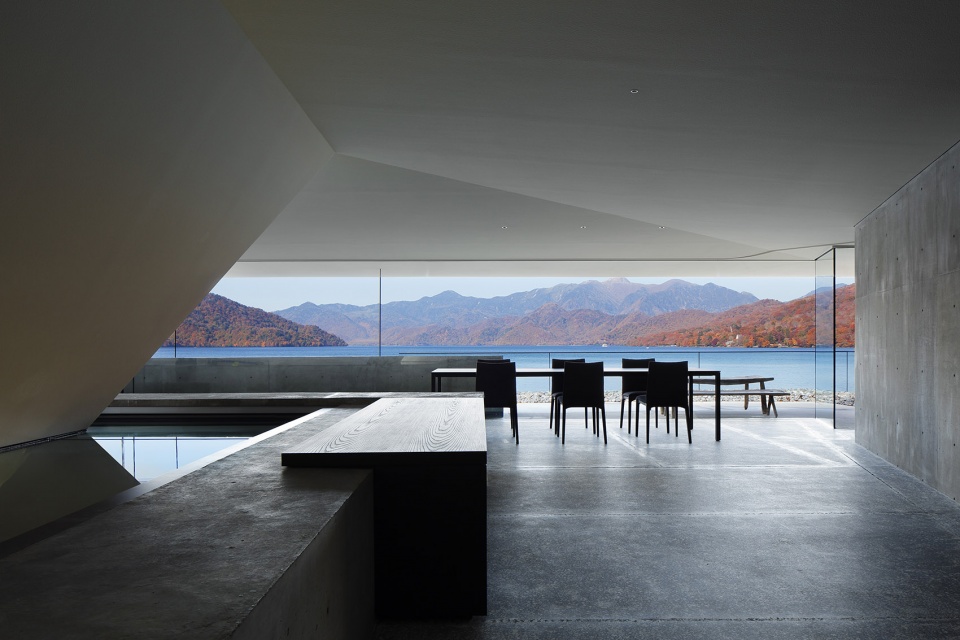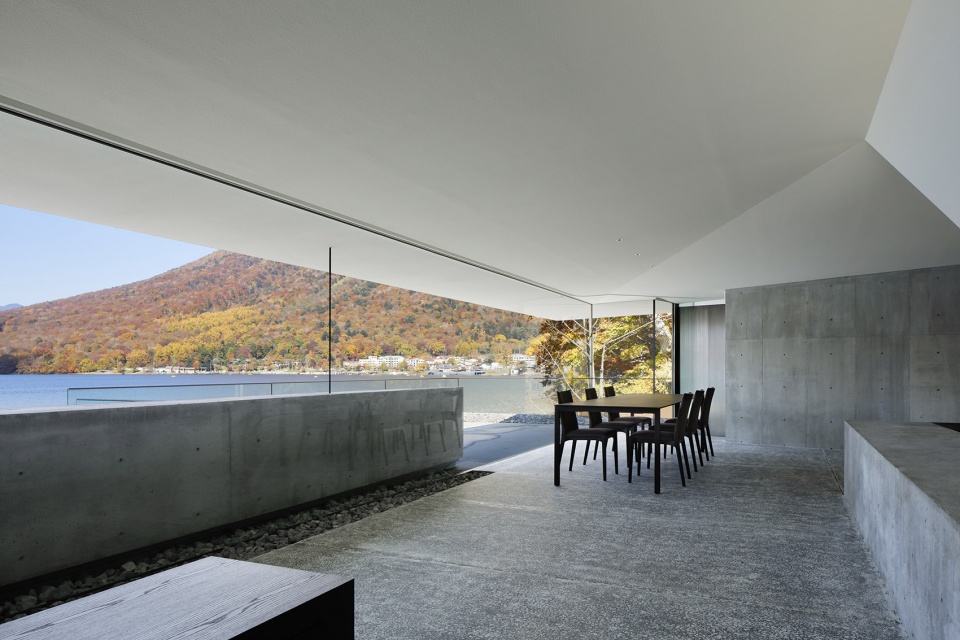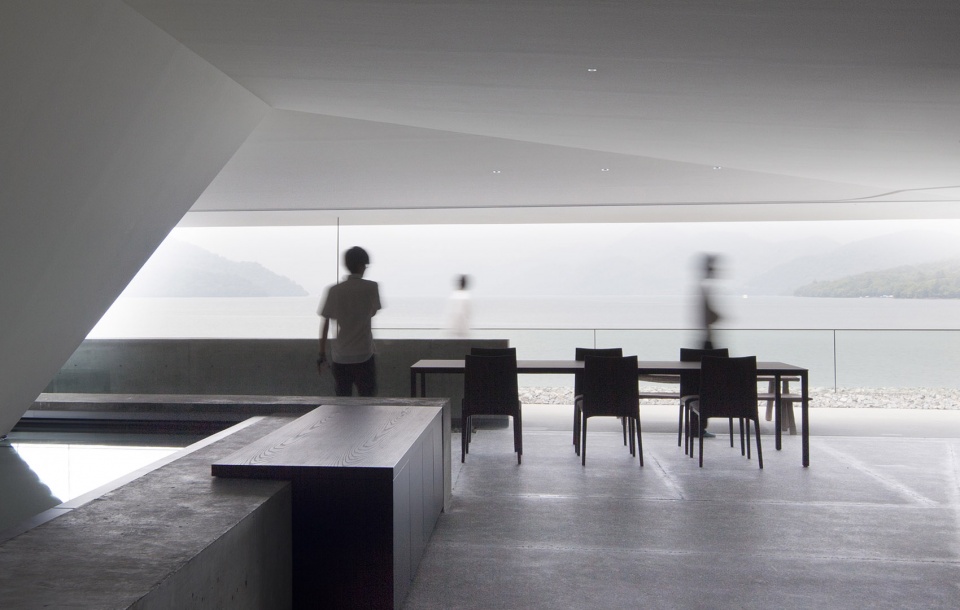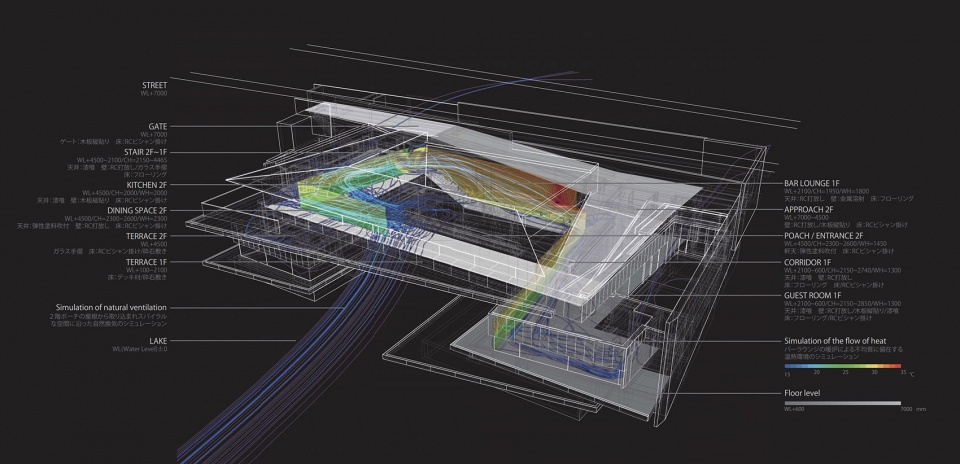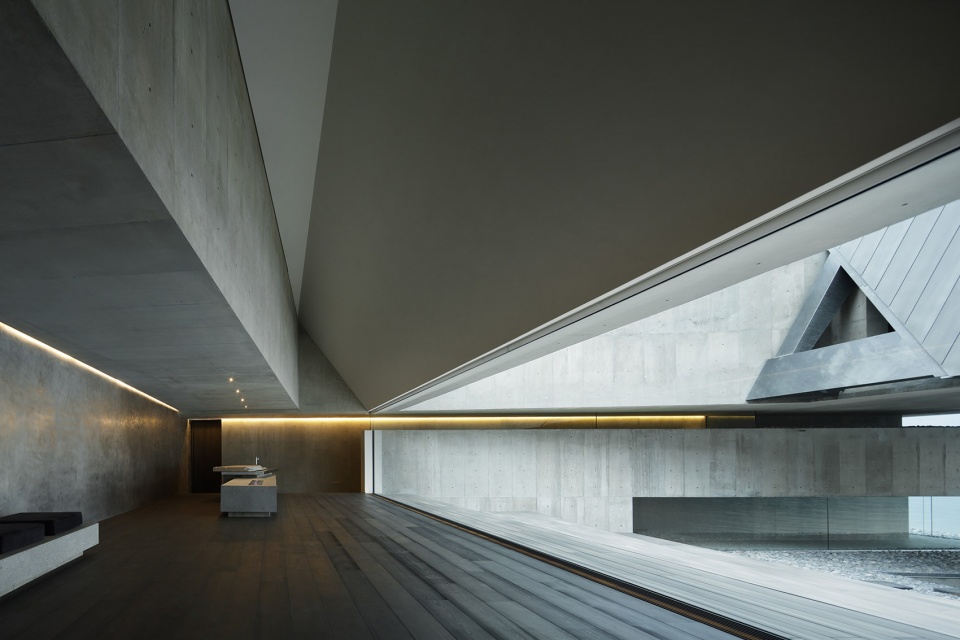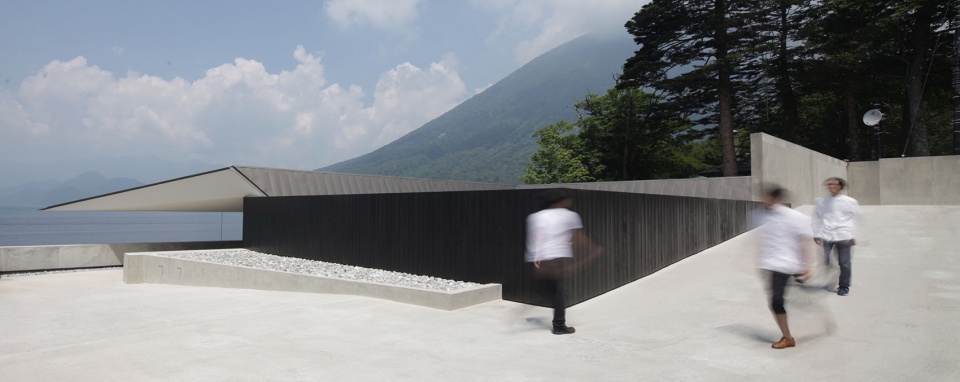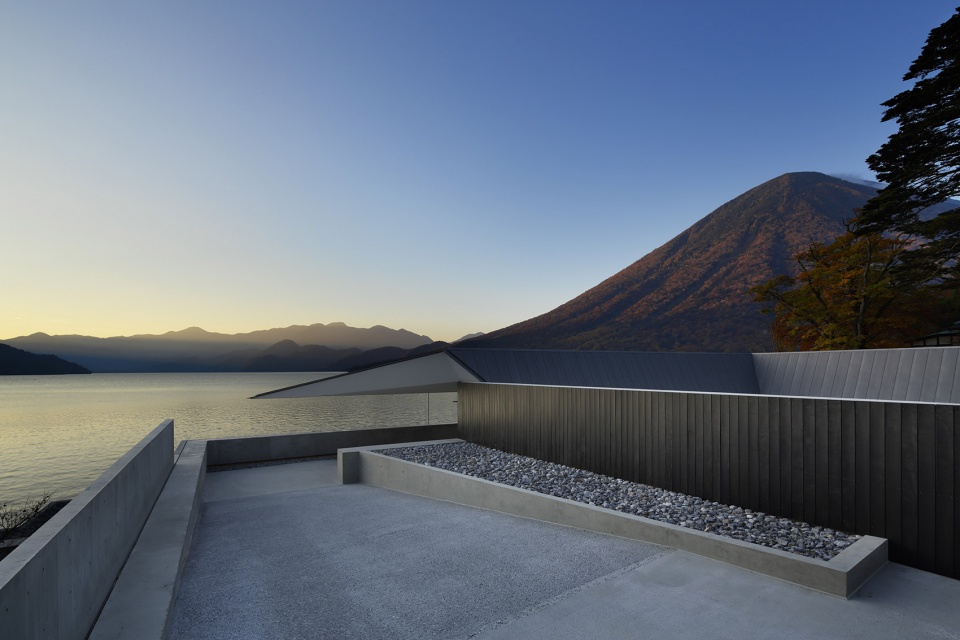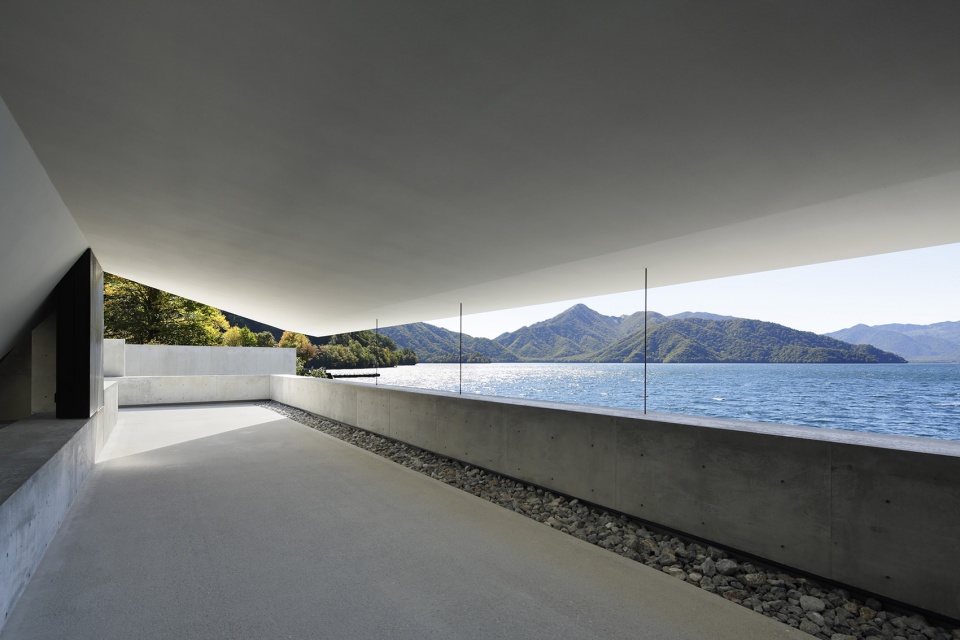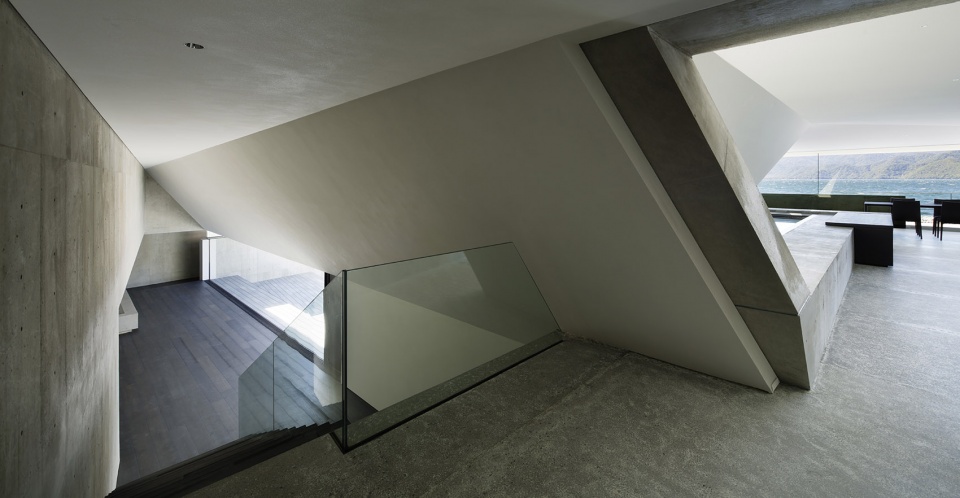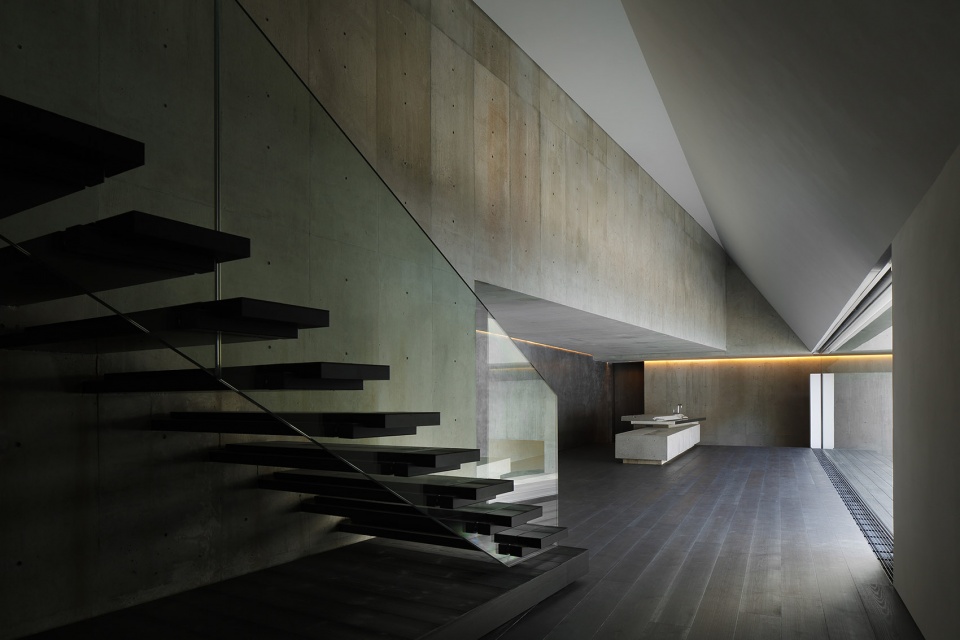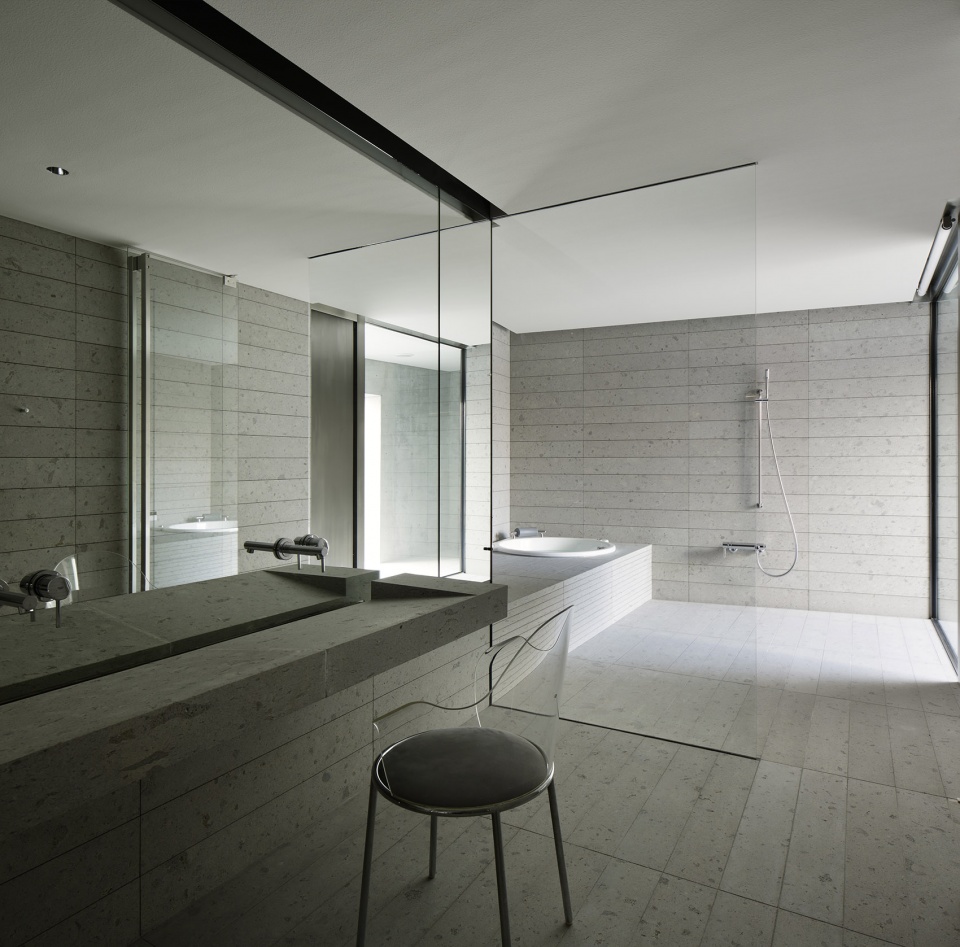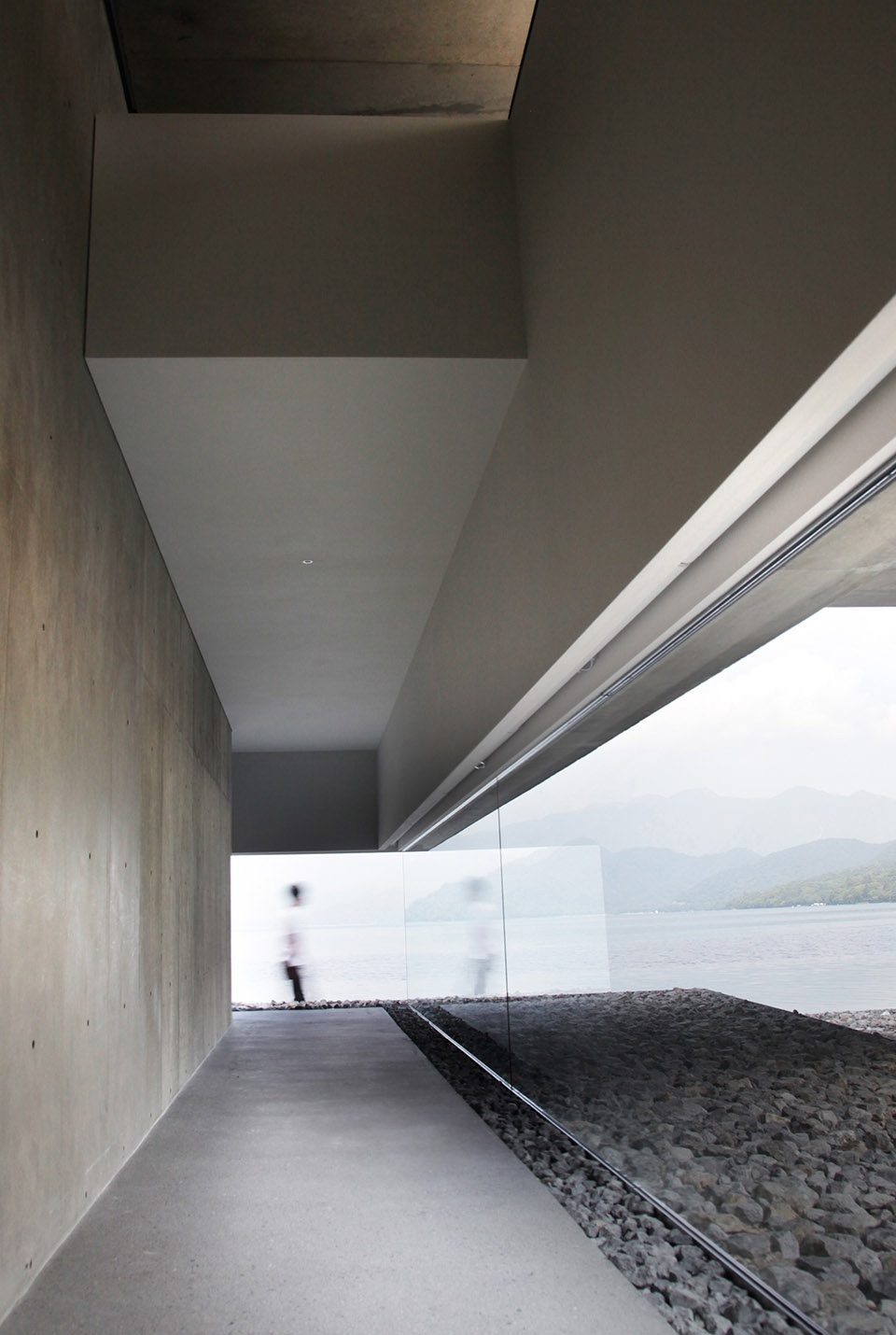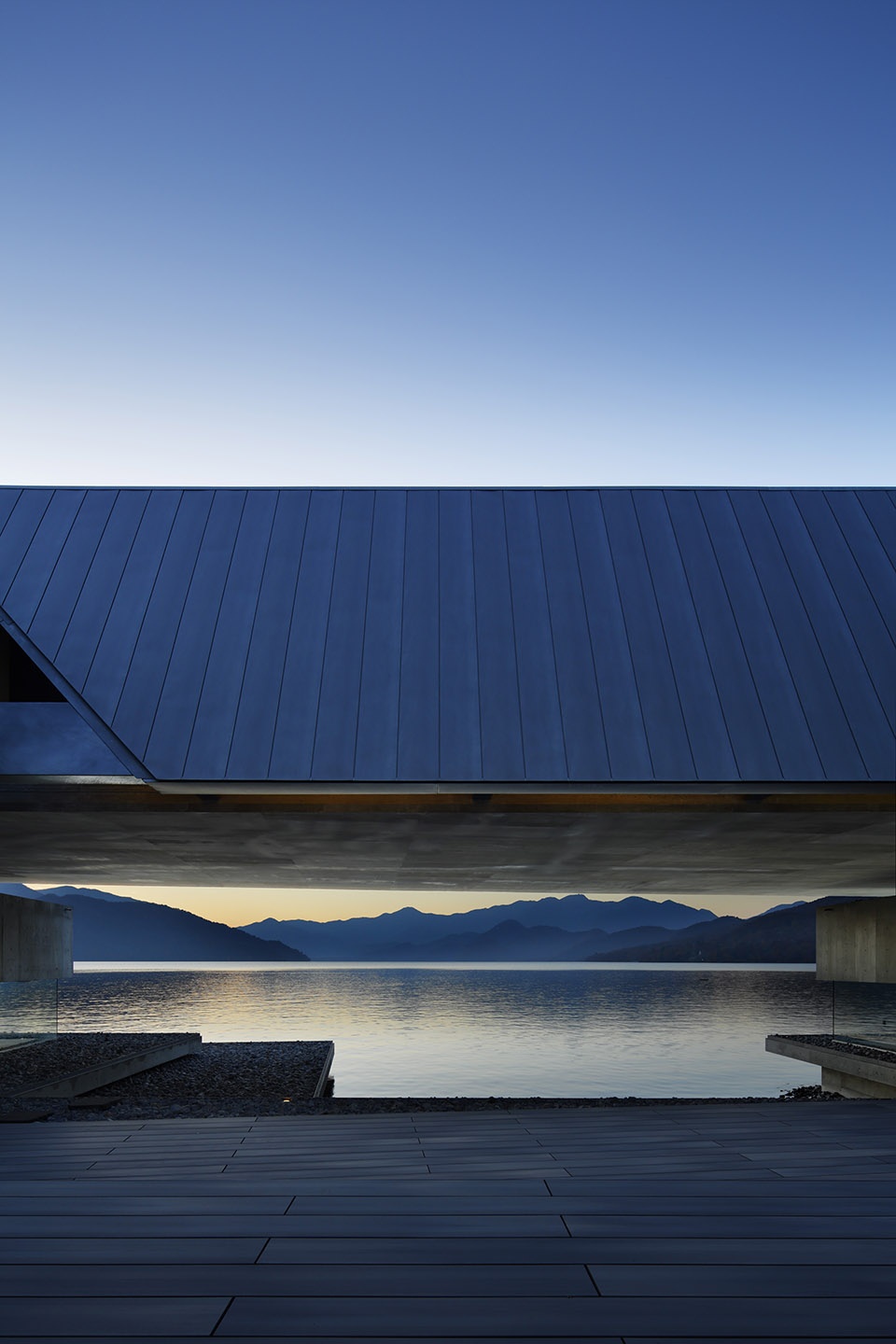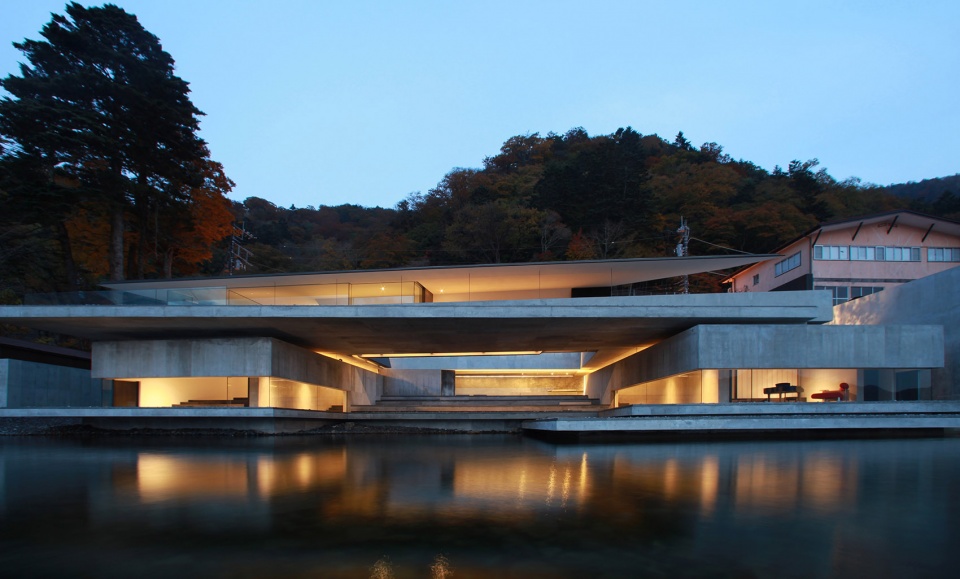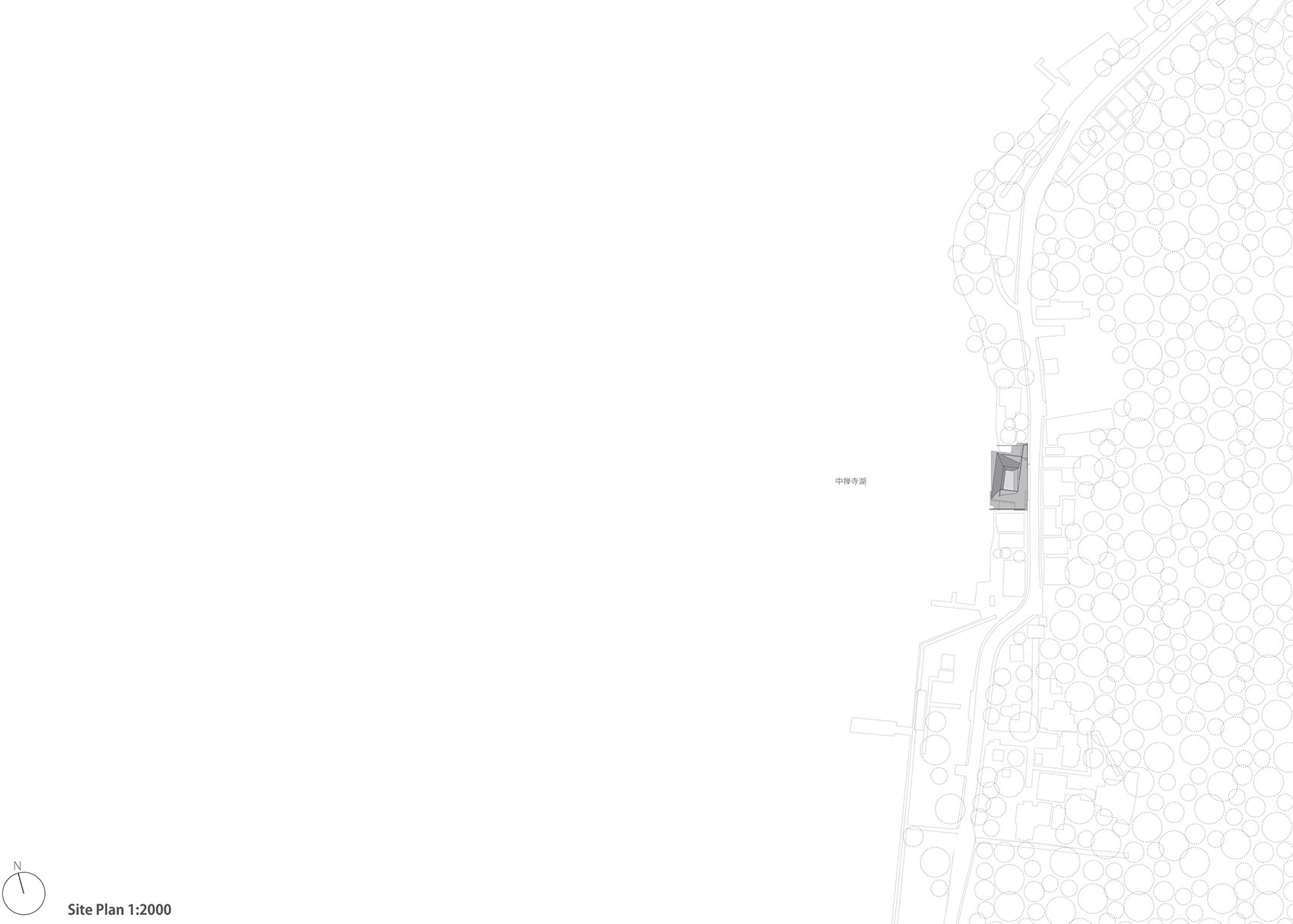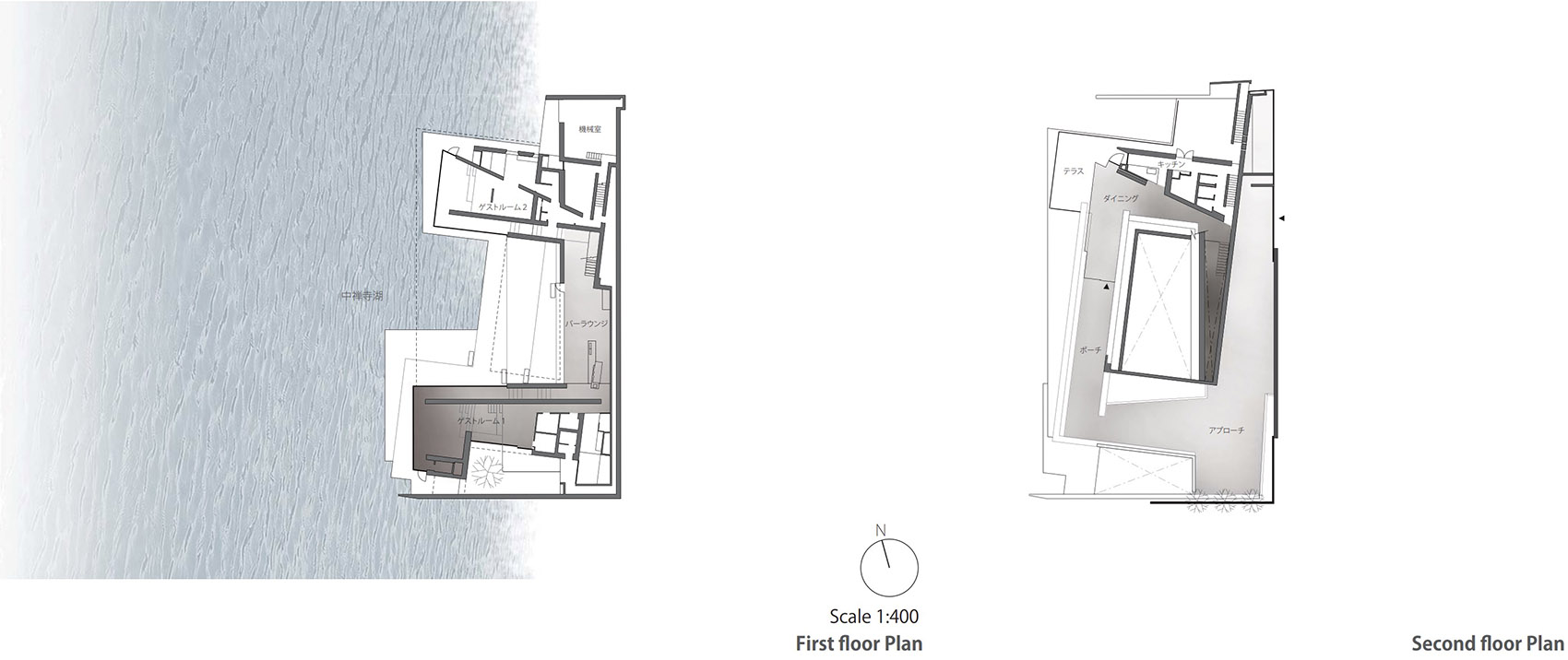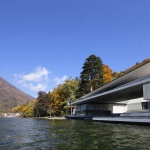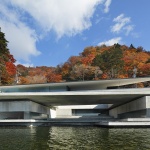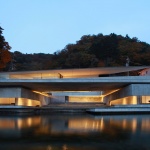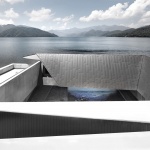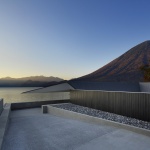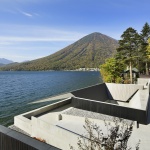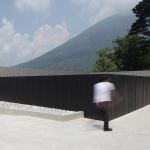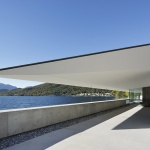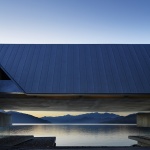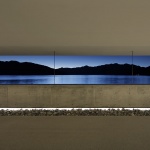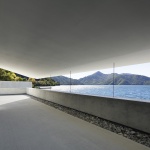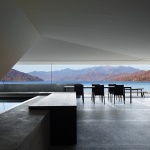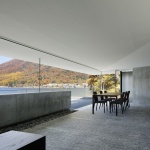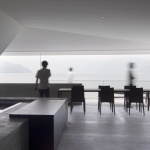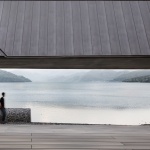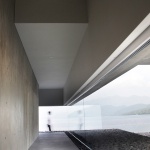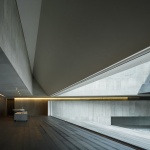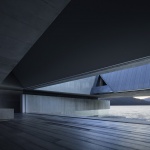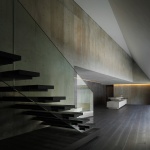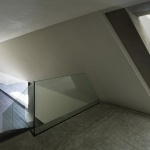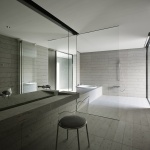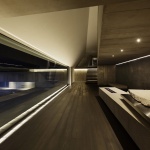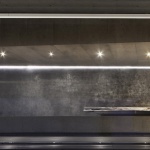感谢 株式会社日建设计 予gooood分享以下内容。更多关于:Nikken Sekkei Ltd
Appreciations towards Nikken Sekkei Ltd. for providing the following description:
概述
Outline
该项目位于日光中禅寺湖,很早以前湖边便林立着成排的外国大使馆别墅。这个项目是在拆除湖畔5层楼的企业疗养院后,新建一个低矮的亲水型别墅。
The site of this building is located at Lake Chuzenji in Nikko city. Its lakeshore has been lined up with summer houses of foreign embassies since quite some time ago.The project is to pull down a 5-story recreational facility of a company and build a new, private summer house for an individual client. The building is built as close to the waterside of the lake as possible, while its height is kept low.
▼建筑外观,exterior view ©Harunori Noda
▼屋顶视角,roof top view ©Koji Fujii
两层建筑建在约7m宽的呈斜坡状的地块上,由于地势自道路向湖泊逐渐降低,因而采用了由高到低的动线设计,即由道路进入以迎宾餐厅为中心的二楼空间后,再沿着螺旋状空间徐徐下到配有卧室的一楼。拆除原有建筑和湖泊间的驳岸,将湖水引入位于一楼中心的中庭,横跨顶部的20m长大跨度屋盖框出一片如诗如画的湖景。
▼螺旋状空间动线,sequential diagram ©Nikken Sekkei Ltd
A two-story building is placed at a location with inclined topography, where its height level goes down from a road to the lakeside in 7m. The circulation of this building is designed to be accessed from the road, to the 2nd floor level provided with a main dining space for welcoming guests, while the spiral configuration of the building gradually leads the guests to the 1st floor level with bedrooms. The 1st floor plan brings in the lake water to an inner garden by removing the shoreline protection work existed between the lake and the previous building. The scenery of the lake is framed by a 20m long, large spanned floor slab, which extends over the garden area.
▼大跨度屋盖框出一片如诗如画的湖景,the scenery of the lake is framed by a large spanned floor slab extending over the garden area ©Harunori Noda
最大程度确保湖景的结构设计
The structure design to provide the best vista to the lake
二楼的门廊一直延伸到用餐空间,其上部架设有悬挑式的钢结构屋顶。充分考虑到1.2m的最大积雪量,通过在预先设计好倾角的钢梁前端以3m间隔配置撑杆(SUS13φ)持续增加张力,可缓解积雪产生的荷载并防止屋顶变形。由于这些撑杆的反作用力来自SRC反梁(为使一楼的屋檐看起来平整而设),所以同时具有减小大跨度平板变形的作用。
由于解决了积雪导致屋顶变形的问题,从而能够采用无边框大幅玻璃以最大限度确保湖景视野。玻璃宽达10m,这已经是蜿蜒曲折的日光红叶坂(又称伊吕波山道)可以运输的最大尺寸。
▼剖面图,section ©Nikken Sekkei Ltd
The porch area on the 2nd floor continues to the dining space covered with a steel frame cantilevered roof. Considering snowfall on the roof as much as 1.2m deep, the steal beam of the roof is cambered in advance, and sag rods (SUS13φ) are placed in 3m intervals at the roof tip for consistently adding tension to the roof. These structural designs prevent from the deformation of the roof at the time of heavy snowfall, as the tension to the roof is relieved by snow load. The reaction force of those sag rods are taken from the reversed beam of the steel reinforced concrete (SRC), which is utilized for making the eaves soffit of the 1st floor appear straight and flat–therefore those structural designs also reduce the deflection of the long-spanned floor slab at the same time.
By managing the deflection of the roof against snow load, it becomes possible to utilize large-sized sashless glasses to maximize the vista to the lake. The glass has the width of 10m for its dimension, while this is the maximum size to carry through the severely winding road of Iroha-zaka sloping road in Nikko city.
▼二楼门廊,the porch area on the 2nd floor ©Koji Fujii
▼用餐空间,dining area ©Koji Fujii
▼无边框大幅玻璃最大限度确保湖景视野,large-sized sashless glasses were used to maximize the vista to the lake ©Harunori Noda
利用BIM模型进行的序列研究和热环境模拟
Study of visual sequence and thermal environment simulation using BIM model
在设计过程中,我们将场地周围地形和山脉的数据输入到BIM模型中,以便找到可确保最佳景观视野的最优建筑布局。此外,还利用BIM模型按照沿建筑动线的视觉序列,对各房间的比例平衡及开口的形状与高度进行研究。进入施工图设计阶段后,更是具体到各处的细节和装饰材料乃至家具配置。
BIM模型还广泛应用于减轻积雪导致屋顶变形的结构验证、利用螺旋状连续空间的自然通风以及一楼酒吧壁炉的热环境模拟。
▼BIM模型,BIM model ©Nikken Sekkei Ltd
During the design process, data of the topography and the mountain range around the site was entered to the BIM model in order to study and find the most suitable location of the building for getting the best vista of the surrounding scenery. This model was also used to study the balance of the scale of each room, and the shapes and the heights of the openings in consideration to the visual sequence along with the circulation inside of the building. During the execution design process, more in depth studies were made by using the BIM model for the details of each part of the building, finishing materials, and placement of furniture.
This BIM model was further and well utilized for examining the structure to control the roof deflection under snow fall, and studying the natural ventilation by making use of the continuous spiral space, and simulating the thermal environment of the heat produced by the fireplace in a lounge space with a bar corner.
▼酒吧和休息室,bar lounge ©Koji Fujii
▼屋顶平台,roof terrace ©Harunori Noda (below) Koji Fujii (bottom)
凉爽怡人气候中,畅享水畔生活的避暑别墅
A guesthouse promising a pleasant time by the water in the balmy summer weather
静静坐落于湖畔的建筑,其入口到卧室被设计成螺旋状绵延的空间。得益于螺旋状的造型,可畅享随步履轻移而变化万千的水景。与此同时,随着距水面物理距离的不断变化,滨水带来的各种环境要素在螺旋状空间中接连不断地呈现,湖面上泛起的潺潺涟漪、反射的粼粼波光、湿度和热辐射等等。由于整个空间高低不一且形状较长,壁炉带来的热度和干燥空气并不能创造出均匀的室内环境,各个区域想必会呈现出不同的热环境。如此一来,各种环境重叠往复,形成既连续又多样化的空间。
▼滨水环境在螺旋状空间中接连不断地呈现,the various lakeside environments are carried on into the spiral but non-uniform distribution of spaces ©Koji Fujii
▼休闲室楼梯,stair to the lounge ©Koji Fujii
▼客房浴室,bathroom ©Koji Fujii
Situated alongside a lake, this guesthouse was designed as a continuous spiral space flowing from the approach to the bedrooms. Each step taken deeper inside the building reveals a changing lakefront view. The various lakeside environments, including the sound of ripples, light reflecting from the water surface, the humidity and thermal radiation, are also carried on into the spiral, but in a non-uniform distribution due to changes in physical distance from the water surface. Since the whole structure is an interconnected space with different elevations, there is no homogeneous environment—various areas present various thermal environments such as the fireplace warmth and the dryness of the air.
▼随步履轻移而变化万千的水景 ©Harunori Noda
each step taken deeper inside the building reveals a changing lakefront view
我们希望到访游客漫步在水滨带来的各种空间环境中时,能够找到适合自己的场所尽享其乐。即使在夏夜室内仍需部分暖气供应的自然环境中,部分到访者会停留于壁炉旁享受抚慰人心的温暖。另一方面,想必也有人会偏爱这里的宁静和凉意。入秋至开春,气候变得寒冷,周围的自然环境不再适合接待宾客,该建筑会“进入冬眠”闭门谢客,而绝不浪费能源破坏自然环境。我们设计的就是这种极具「款待之道」的度假别墅。
▼从中庭望向湖景,view to the lake from the garden area ©Koji Fujii
Guests wander around in this atmosphere, discovering and enjoying spots they find comfortable. Located in a natural environment that requires a bit of heating in the building even during the summer nights, one may find joy in the warmth near the fireplace, while another may relish the area’s tranquility and cold characteristic. The building is closed during the harsh winter season to prevent any wasteful investment of energy.
This is the kind of hospitality this guesthouse promises to deliver.
▼别墅夜景,night view ©Harunori Noda
▼场地平面图,site plan ©Nikken Sekkei Ltd
▼一层和二层平面图,first and second floor plan ©Nikken Sekkei Ltd
项目业主 个人
设计团队 山梨知彦,恩田聪,青柳创
项目位置 栃木县日光市
用地面积 1,325.16 m²
占地面积 640.50㎡
建筑面积 751.92 m²
最高高度 7.33 m
建筑结构 钢筋混凝土结构
竣工日期 2015年
Client: Private
Design Team: Tomohiko Yamanashi, Satoshi Onda, Hajime Aoyagi
Location: Tochigi, Japan
Site area: 1,325.16㎡
Building area: 640.50㎡
Total floor area: 751.92㎡
Building height: 7.33 m
Structural system: reinforced concrete
Completion: 2015
More: 株式会社日建设计。更多关于:Nikken Sekkei Ltd
